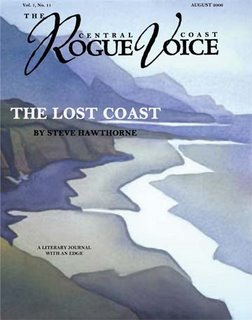
EDITOR'S RANT
Feeling cranky
By Stacey Warde
Recently, while putting together this edition of The Rogue Voice, Dell asked me how the paper looked.
“It’s cranky,” Dell. “We’ve a got cranky edition.”
“It’s always cranky,” he retorted.
“Well,” I said, “this one’s really cranky.”
For example, did you ever make a run up the rugged Big Sur coastline and think about pushing your mate off the cliff’s edge?
If you have, you’ll understand what we mean by cranky. If you haven’t, you’ve never been cranky enough in your life to feel real misery.
Steve Hawthorne, who wrote May’s cover, “Boundary,” returns this month with poetic insight into life on “The Lost Coast”, where a dentist and his marble-loving wife come to terms.
Hawthorne’s fiction reads like poetry and requires the same attentiveness and playfulness from its readers that poetry demands from its creators.
While this edition may be crankier than past issues, we think it’s also more artful. We’re pleased to feature the lovely artwork of Cambrian artistst Donald Archer, who was the contributor of a fine book review in our debut October 2005 edition. His painting, “Northern Coast” gives the surreal, hard- and soft-edged feeling we wanted on the cover to illustrate Steve’s prose poem. You’ll find two more of Donald’s paintings, “Big Sur Overlook,” and “Morning Fog, Pt. Conception,” accompanying Steve’s tale of these familiar landscapes.
You can see more of Donald’s work online at www.donaldarcher.com. Or, you can find his webpage through a link on our new blog: www.theroguevoice.blogspot.com. Thanks to commie, pinko, traitor Steve Terranova [“Why I’m not patriotic,” July 2006] for his effort getting us started online.
***
The poetic voice, I’ve learned, carries more weight and substance and ultimately more power than the song and dance we get from ad hacks. It’s said that advertising is a poignant marker of a culture’s obsessions and neuroses.
More powerful for me are the poets whose integrity compels them to write what they see and unveil the naked truth about our lives.
They are today’s only truly prophetic voices, demanding wakefulness and accountability. Hear what they say:
The winds of paradise are blowing. / False prophets and wishful thinkers can’t murder fast enough.
Michael Hannon of Los Osos sent this warning with his poem,”History of War” (11), which was first published in a literary journal, “BAKUNIN,” after the first Gulf War. “When is war not a gulf?” Michael asked in his cover letter introducing the poem.
Yes, we’re feeling just as cranky as you are, Michael. We see the gulf spreading wider every day.
Two other poets tapped into a similar thread where fear leads to self-betrayal, murder and war.
Regular contributor Todd Young writes, “Treason” (2), and Lee Carpenter offers “Tears for Fallujah” (17), poems that ask us to reflect deeply on the nature of our lives.
I always stand up and take notice when three poets send in poems at the same time giving voice to similar themes: our willingness to betray ourselves, our willingness to kill. I give more weight to these barometers of culture than to the pretty faces and sultry voices selling beer and automobiles.
The poet says we’re running out of oil while the ad hacks tell us we’ll be safe and can go anywhere in a Hummer.
This is the kind of cultural malaise that makes us cranky, makes us want to defy our neighbors the way Dell Franklin does in his “In defiance of the maintenance cycle” (20).
It’s the sad state of affairs that makes it impossible for a sweet guy like Ben Leroux to fall in love with a quaint little town like Las Vegas, N.M., where storeowners are so cheap and petty they’ll pay you $5 an hour or less to wash their windows (8).
It’s the hypocrisy of slamming the doors on the life of a human being in one of the most brutal institutions ever known to our kind, and expecting that person to rehabilitate himself and find his way back into “civilized” life as a healthy, contributing member of society (6).
It’s the corporate wolf in sheep’s clothing making a living off the misery of others (4).
And it’s why so many soldiers, dedicated to their careers and the men they lead, have trouble keeping a wife and family (16).
In the midst of this malaise, solutions arise through the art and poetry and stories we tell about our selves and the world in which we live. They may come off as cranky or miserable or wretched, but in the end, there’s something redemptive about them, something suggesting the dignity of wounded — “belligerent & frightened,” Todd writes — souls finding their way back home. §



2 Comments:
I was wondering if you ever considered changing the layout of
your blog? Its very well written; I love what youve
got to say. But maybe you could a little more
in the way of content so people could connect with it better.
Youve got an awful lot of text for only having one or two pictures.
Maybe you could space it out better?
Review my website ... white by vera wang shoes
Relevant!! Finally I've found something which helped me
Post a Comment
<< Home